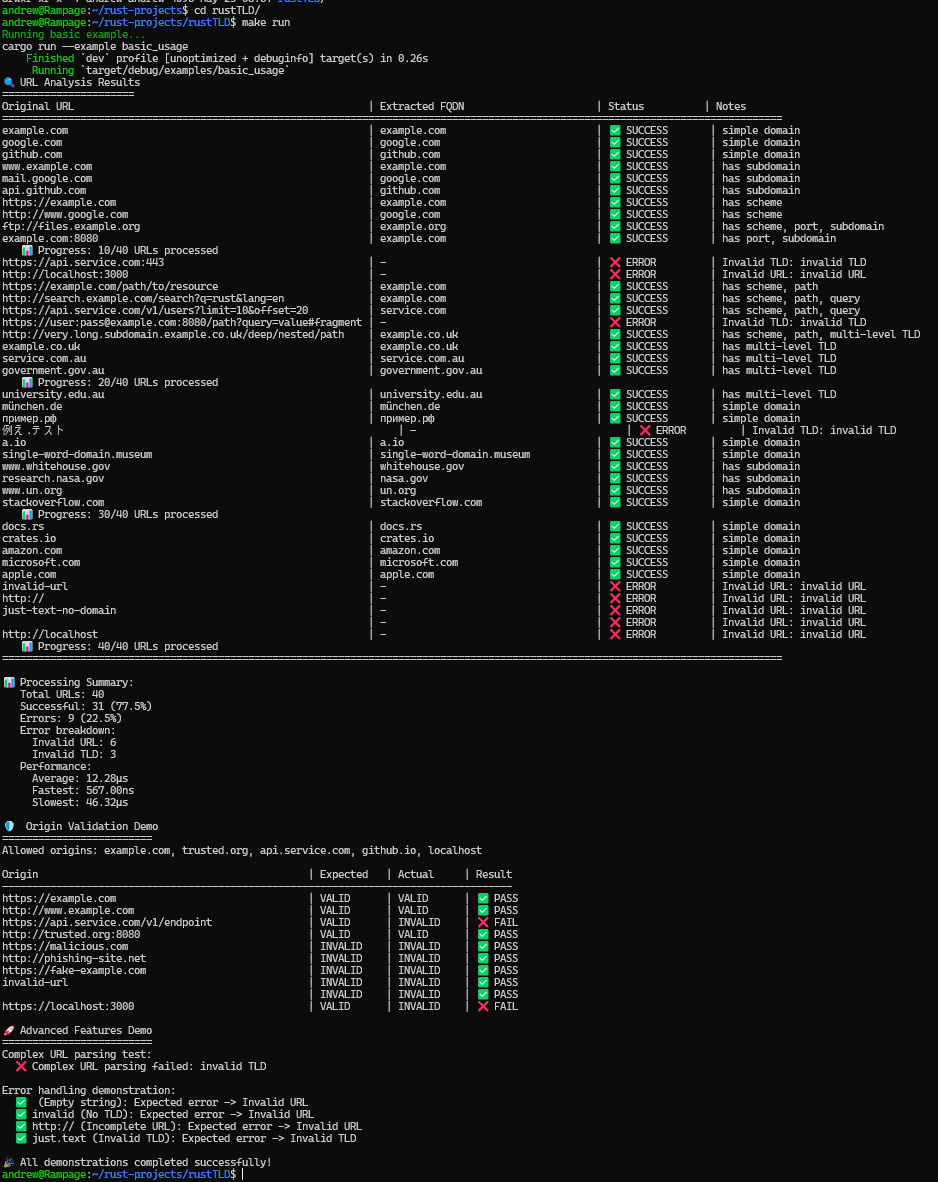A high-performance Rust library for extracting fully qualified domain names (FQDNs) from URLs using the Mozilla Public Suffix List. This library provides fast, accurate domain extraction with full async support and thread-safe operations.
- 🚀 High Performance: Optimized for speed with concurrent processing
- 🔒 Thread Safe: Built with Rust's ownership system and async/await
- 🌐 Standards Compliant: Uses the official Mozilla Public Suffix List
- 🎯 Accurate Parsing: Correctly handles complex domains like
example.co.uk - ⚡ Async First: Fully async API with sync convenience functions
- 🛡️ Memory Safe: Zero-copy operations where possible
- 📦 Easy Integration: Simple API with comprehensive error handling
Add this to your Cargo.toml:
[dependencies]
rust-tld = "0.1.0"
tokio = { version = "1.0", features = ["full"] }use rust_tld::{init, get_fqdn};
#[tokio::main]
async fn main() -> Result<(), Box<dyn std::error::Error>> {
// Initialize the library (downloads Public Suffix List)
init(None).await?;
// Extract FQDNs from various URL formats
let fqdn = get_fqdn("https://www.example.com/path?query=value").await?;
println!("FQDN: {}", fqdn); // Output: example.com
let fqdn = get_fqdn("subdomain.example.co.uk").await?;
println!("FQDN: {}", fqdn); // Output: example.co.uk
Ok(())
}use rust_tld::{init, validate_origin};
#[tokio::main]
async fn main() -> Result<(), Box<dyn std::error::Error>> {
init(None).await?;
let allowed_origins = vec![
"example.com".to_string(),
"trusted.org".to_string(),
];
let is_valid = validate_origin("https://example.com", &allowed_origins).await;
println!("Valid origin: {}", is_valid); // Output: true
Ok(())
}use rust_tld::{init, Options};
use std::time::Duration;
#[tokio::main]
async fn main() -> Result<(), Box<dyn std::error::Error>> {
let options = Options::new()
.allow_private_tlds(true)
.timeout(Duration::from_secs(30))
.public_suffix_url("https://custom-suffix-list.example.com/list.dat");
init(Some(options)).await?;
// Your code here...
Ok(())
}| Function | Description | Returns |
|---|---|---|
init(options) |
Initialize the library with optional configuration | Result<(), TldError> |
get_fqdn(url) |
Extract FQDN from a URL (async) | Result<String, TldError> |
get_fqdn_sync(url) |
Extract FQDN from a URL (blocking) | Result<String, TldError> |
validate_origin(origin, allowed) |
Validate origin against allowlist (async) | bool |
validate_origin_sync(origin, allowed) |
Validate origin against allowlist (blocking) | bool |
pub struct Options {
pub allow_private_tlds: bool, // Include private/corporate TLDs
pub timeout: Duration, // HTTP request timeout
pub custom_http_client: Option<Client>, // Custom reqwest client
pub public_suffix_url: String, // Custom Public Suffix List URL
pub public_suffix_file: Option<String>, // Local file path (future)
}pub enum TldError {
InvalidUrl, // Malformed URL
InvalidTld, // TLD not found in Public Suffix List
PublicSuffixDownload(String), // Failed to download PSL
PublicSuffixParse(String), // Failed to parse PSL
PublicSuffixFormat(String), // Invalid PSL format
}Clone the repository and run the interactive example:
git clone https://github.com/yourusername/rust-tld.git
cd rust-tld
# Run with default test URLs
cargo run --example basic_usage
# Run with custom URLs
cargo run --example basic_usage -- https://github.com https://stackoverflow.com
# Run with options
cargo run --example basic_usage -- --private --timeout 30 --verboseOPTIONS:
-h, --help Print help information
-V, --version Print version information
--private Allow private TLDs
--timeout <SECONDS> Timeout for HTTP requests in seconds [default: 10]
--url <URL> Custom URL for public suffix list
-v, --verbose Enable verbose logging
ARGS:
<URLs>... URLs to analyze- Web Security: Validate origins and implement CORS policies
- Domain Analytics: Extract primary domains from referrer data
- URL Processing: Clean and normalize URLs in web crawlers
- Email Validation: Validate email domains against known TLDs
- DNS Tools: Build DNS analysis and monitoring tools
- Cookie Management: Determine appropriate cookie domain scope
- Initialization: ~500ms (downloads and parses 240KB Public Suffix List)
- Extraction: ~10μs per URL (after initialization)
- Memory Usage: ~2MB for loaded Public Suffix List
- Concurrency: Thread-safe with
ArcandRwLock
The library downloads and caches the official Mozilla Public Suffix List, which contains:
- ICANN Domains: Official top-level domains (.com, .org, .uk, etc.)
- Private Domains: Corporate domains (.github.io, .amazonaws.com, etc.)
- Special Cases: Complex rules for domains like .co.uk, .gov.au
// All of these work correctly:
"example.com"
"www.example.com"
"https://subdomain.example.co.uk"
"http://example.com:8080/path?query=value"
"ftp://files.example.org/directory/"Contributions are welcome! Please feel free to submit a Pull Request. For major changes, please open an issue first to discuss what you would like to change.
git clone https://github.com/yourusername/rust-tld.git
cd rust-tld
cargo build
cargo test
cargo run --example basic_usage# Run all tests
cargo test
# Run tests with output
cargo test -- --nocapture
# Run specific test
cargo test test_fqdn_extractionThis project is licensed under either of
- Apache License, Version 2.0 (LICENSE-APACHE or http://www.apache.org/licenses/LICENSE-2.0)
- MIT license (LICENSE-MIT or http://opensource.org/licenses/MIT)
at your option.
- Mozilla Public Suffix List for maintaining the domain suffix database
- reqwest for HTTP client functionality
- tokio for async runtime
- url for URL parsing
- Initial release
- Core FQDN extraction functionality
- Public Suffix List integration
- Async API with sync convenience functions
- Origin validation
- Comprehensive error handling
- Thread-safe operations
Made with ❤️ in Rust



